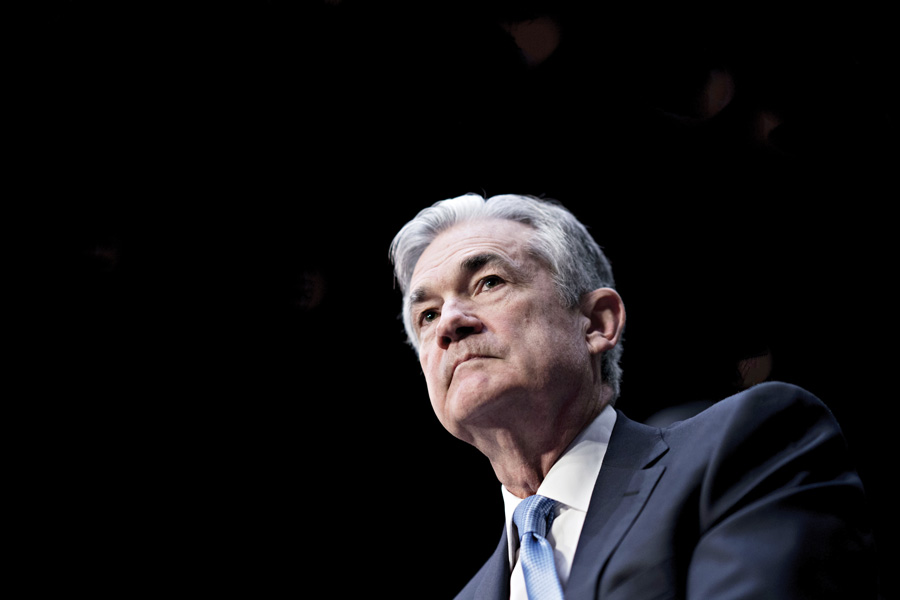

President Joe Biden selected Jerome Powell for a second four-year term as Federal Reserve chair and elevated Governor Lael Brainard to vice chair, maintaining consistency at the central bank as it grapples with the fastest inflation in three decades along with the lingering effects of the coronavirus pandemic
The move, announced by the White House Monday, rewards Powell for helping rescue the U.S. economy from the pandemic and tasks him with protecting that recovery from a surge in consumer prices. A Republican, Powell faces what will likely be a smooth confirmation in the Senate, where he was backed for his first term as chair in an 84-13 vote and whose members he subsequently worked hard to woo.
Brainard would replace Richard Clarida in the vice chair slot and her confirmation may face opposition from Senate Republicans. She was interviewed by Biden for the chair position and was seen as a strong contender for the separate job of vice chair for supervision, which remains vacant.
“Clearly the market is looking at the likelihood that the Fed will increase the rate of tapering and move up the timing of the first rate hike now that Powell” has been renominated, Kathy Jones, chief fixed-income strategist at Charles Schwab & Co. said after the news was released.
Investors expect the Fed to raise rates from near zero in June, according to pricing in interest-rate futures markets. U.S. equities opened higher and Treasuries extended losses after the Fed news.
Biden plans to announce his nomination for the vice chair for supervision, along with additional picks for open seats on the Board of Governors, beginning in early December, the White House said.
Senate Banking Committee Chair Sherrod Brown, an Ohio Democrat, and the top Republican, Patrick Toomey of Pennsylvania, both indicated they would support Powell’s renomination.
Powell, 68, has enjoyed bipartisan support, including from Treasury Secretary Janet Yellen and other Democrats, although progressive Democrats such as Massachusetts Senator Elizabeth Warren lobbied Biden to choose someone more aligned with them on overseeing banks and battling climate change. Powell also had to answer for an ethics scandal after trading revelations by some senior Fed officials.
The choice of Powell will also likely win approval from investors by ensuring continuity at the central bank as it begins unwinding ultra-easy monetary policy amid the challenges of persistent inflation.
Biden, in a written statement, called the economic recovery so far a “testament to the economic agenda I’ve pursued and to the decisive action that the Federal Reserve has taken under Chair Powell and Dr. Brainard to help steer us through the worst downturn in modern American history and put us on the path to recovery.”
Biden added, “I’m confident that Chair Powell and Dr. Brainard’s focus on keeping inflation low, prices stable, and delivering full employment will make our economy stronger than ever before.”
He also singled out what he called their “deep belief that urgent action is needed to address the economic risks posed by climate change, and stay ahead of emerging risks in our financial system.”
The Fed vice chair is traditionally the central bank’s No. 2 official, playing a key role in supporting the chair and sending policy signals.
Brainard and Powell have similar views on monetary policy, but differ over bank regulation, with Brainard opposing at nearly every step Powell’s modest rollbacks of some of the tough curbs imposed on banks after the financial crisis.
Brainard, 59, was appointed a Fed governor in 2014 by President Barack Obama. In 2020, Biden considered picking her as Treasury Secretary, before he picked Janet Yellen.
A graduate of Harvard University, Brainard served in Bill Clinton’s White House as deputy national economic adviser. In 2009, under Obama, she joined the Treasury and became undersecretary for international affairs in 2010.
Powell’s second term is going to be very different from his first. While the economy is rebounding, inflation is running at a three-decade high, Covid-19 cases remain elevated and strained supply chains present big uncertainties.
Some officials are already suggesting the Fed may need to pull back its massive asset-purchase program faster than now planned, and Powell will also be presiding over a committee with a number of members who likely want to raise interest rates sooner than he does.
Powell said this month he won’t consider hiking rates until the labor market shows greater signs of healing.

The recently enacted OBBBA makes lower tax rates "permanent," though other provisions could still make earlier Roth conversions appealing under the right conditions.

Americans with life insurance coverage are far more likely to feel assured of their loved ones' future, though myths and misconceptions still hold many back from getting coverage.

Mounting regulatory pressures and proposed taxes are putting a strain on higher education institutions, forcing renewed focus on liquidity management and the secondary market for private equity.

Poll of 1,500 retirement plan investors finds 45% interested in private equity and private debt, with more than three-quarters saying they'd ramp up contributions as a result.

Most firms place a limit on advisors’ sales of alternative investments to clients in the neighborhood of 10% a customer’s net worth.
Orion's Tom Wilson on delivering coordinated, high-touch service in a world where returns alone no longer set you apart.
Barely a decade old, registered index-linked annuities have quickly surged in popularity, thanks to their unique blend of protection and growth potential—an appealing option for investors looking to chart a steadier course through today's choppy market waters, says Myles Lambert, Brighthouse Financial.
